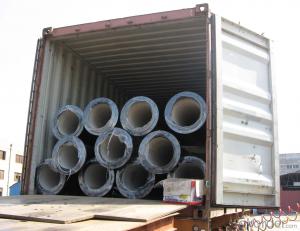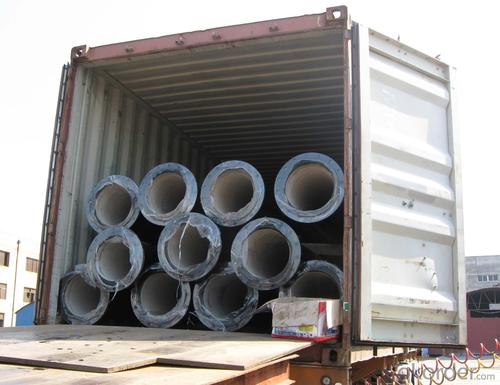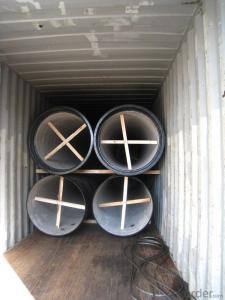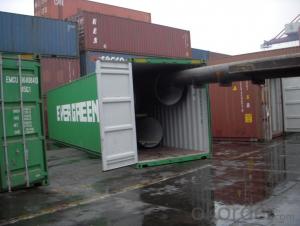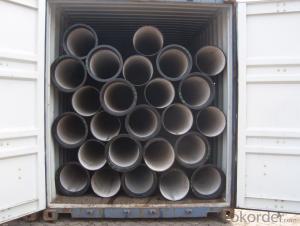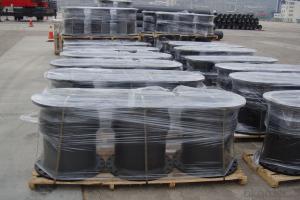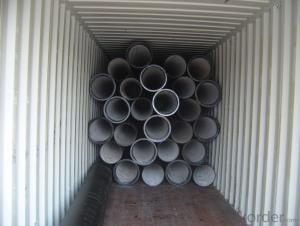DUCTILE IRON PIPES AND PIPE FITTINGS K8 CLASS DN1600
- Loading Port:
- Tianjin
- Payment Terms:
- TT OR LC
- Min Order Qty:
- 22 pc
- Supply Capability:
- 3000 pc/month
OKorder Service Pledge
OKorder Financial Service
You Might Also Like
Material : Ductile Cast Iron
Size Range : DN 80mm to DN 2000mm
Unit Effective Length : 6m or 5.7m
Manufacture Standard: ISO 2531:1998/ EN 545:2006/EN 598:2007
Annual capacity : 200,000 tons
Coating Exterior: Zinc 130g/m2 according to ISO 8179-1 and bitumen coating 70 microns.
Cement Interior: Portland Cement/ High Alumina Cement/ Sulphate Resisting Cement Lining according to ISO 4179
Special requirements on external coating and internal lining can be applied
We also provide accessories such as SBR/EPDM rubber gaskets, lubricant paste, pipe caps, PE sleeves, etc.
Additional Parts:
Each pipe is strictly inspected according to related standard to ensure permanently high performance.
Easy Installation at site and service free for life
Long Service Lifespan
Quotation will arrive you within 24hours once we get your inquiry.
We guarantee offering you a competitive price.
A copy of original inspection reports of pipes will be offered after shipment.
Photos of loading process will be sent to the customer after shipment effect.
We will follow-up the delivery progress after shipment effect and update to the customer on weekly basis.
- Q: What are the different types of coatings available for ductile iron pipe?
- Ductile iron pipe offers a range of coating options, each with its own unique properties and benefits. 1. One commonly used coating is cement mortar. It involves applying a layer of cement mortar to both the interior and exterior surfaces of the pipe. This coating protects against corrosion and abrasion, while also improving hydraulic efficiency. 2. Another popular choice is polyethylene encasement. This involves wrapping the pipe with a layer of polyethylene material. It provides excellent corrosion resistance, especially against soil and water contaminants. 3. Fusion-bonded epoxy (FBE) coating is applied by heating epoxy powder to create a strong bond with the pipe surface. It offers outstanding corrosion resistance and is commonly used in aggressive environments like wastewater treatment plants and chemical processing facilities. 4. Zinc coating, also known as galvanization, is applied by adding a layer of zinc to the pipe's surface. It provides excellent corrosion resistance and is often used in outdoor applications exposed to moisture and humidity. 5. Bituminous coating is a black, tar-like substance that protects against corrosion. It is commonly used in underground applications where the pipe is in contact with soil or water. 6. Polyurethane coatings are known for their resistance to abrasion, impact, and chemical corrosion. They are often used in aggressive environments such as oil and gas pipelines. These examples highlight the different coatings available for ductile iron pipe. The choice of coating depends on factors like the intended application, environmental conditions, and desired level of corrosion protection. It is crucial to consult industry experts and follow relevant standards and specifications when selecting a coating for ductile iron pipe.
- Q: Do ductile iron pipes require additional protection against external factors?
- It is necessary to provide extra protection for ductile iron pipes due to external factors. Despite being strong and durable, ductile iron pipes are susceptible to corrosion and other threats that can cause pipe failure. The primary external factor that ductile iron pipes require protection from is corrosion. Corrosion can weaken the pipe over time and is caused by certain chemicals present in soil or water. To prevent corrosion, ductile iron pipes are often coated with substances like polyethylene or zinc. This coating acts as a barrier, safeguarding the pipe against corrosive elements and prolonging its lifespan. In addition to corrosion, ductile iron pipes may also need protection against physical damage. These pipes are typically buried underground, making them vulnerable to forces like heavy machinery, ground movement, and vandalism. To protect against physical damage, ductile iron pipes can be encased in concrete or surrounded by a protective sleeve or casing. Furthermore, ductile iron pipes may require protection against soil conditions that can lead to pipe movement or shifting. In areas with unstable soil, it may be necessary to implement measures such as proper bedding and backfilling techniques, as well as the use of anchoring devices. These measures ensure the stability and integrity of the pipes. To conclude, although ductile iron pipes are strong, they still need additional protection against external factors. This includes preventing corrosion, protecting against physical damage, and addressing soil conditions. By implementing these protective measures, the lifespan and performance of ductile iron pipes can be significantly extended, ensuring the reliable transportation of water and other fluids.
- Q: What are the specifications for the installation of water ball iron pipes?
- Groove support: according to the groove soil, groundwater, slotted cross section, load conditions and other factors, the design requirements are firm and reliable, to prevent landslides, support, shall not impede the lower pipe and stable pipe.
- Q: Can ductile iron pipe be used for irrigation systems?
- Yes, ductile iron pipe can be used for irrigation systems. Ductile iron is a strong and durable material that can withstand the high pressure and constant flow of water required for irrigation systems. It is resistant to corrosion, making it suitable for underground applications where it may come into contact with moisture and soil. Additionally, ductile iron pipes have the advantage of being able to handle heavy loads, which is important for irrigation systems that may require the use of heavy machinery or vehicles. Overall, ductile iron pipe is a reliable and long-lasting choice for irrigation systems.
- Q: Are ductile iron pipes resistant to chemicals or solvents?
- Ductile iron pipes are generally resistant to a wide range of chemicals and solvents. This is due to their composition, which includes a high percentage of iron and carbon, along with small amounts of other alloying elements like silicon, manganese, and magnesium. These alloying elements contribute to the overall strength and durability of ductile iron pipes, making them highly resistant to corrosion and chemical attack. However, it is important to note that the resistance of ductile iron pipes to chemicals and solvents can vary depending on the specific substance and its concentration. Some aggressive chemicals or solvents, particularly those with high acidity or alkalinity, may cause gradual corrosion or degradation of the pipe material over time. In such cases, it is advisable to consult with the pipe manufacturer or a professional engineer to ensure the compatibility of the pipe with the specific chemicals or solvents being used. Additionally, proper installation and maintenance practices play a crucial role in maintaining the chemical resistance of ductile iron pipes. Regular inspection, cleaning, and protective coatings can help to prolong the lifespan and performance of the pipes in the presence of various chemicals or solvents.
- Q: How does ductile iron pipe perform in corrosive environments?
- Ductile iron pipe performs exceptionally well in corrosive environments due to its inherent corrosion resistance properties. The pipe's protective lining and external coatings provide an additional layer of defense against corrosion, ensuring long-term durability and reliability even in harsh conditions.
- Q: What does ductile iron pipe "ND200" mean?
- The tube is thin from the metal tube, and the outer diameter of the tube is almost the same as the inner diameter of the tube, so the average value of the outer diameter of the tube and the inner diameter of the pipe is called the diameter.
- Q: Can ductile iron pipes be used for fire protection systems?
- Yes, ductile iron pipes can be used for fire protection systems. Ductile iron is a type of cast iron that exhibits high strength and flexibility, making it suitable for a wide range of applications, including fire protection systems. It has excellent mechanical properties, including high tensile strength and impact resistance, which are important factors for withstanding the high pressures and stresses that can occur during fire suppression efforts. Ductile iron pipes are known for their durability and longevity, which is crucial for fire protection systems that need to be reliable and functional for extended periods of time. They have a longer lifespan compared to other materials, such as PVC or galvanized steel, and are less prone to corrosion, which is especially important for fire protection systems as they need to remain operational even after long periods of inactivity. Furthermore, ductile iron pipes have excellent fire resistance properties. They can withstand high temperatures without losing their structural integrity, ensuring that the fire protection system remains intact and functional during a fire emergency. This is crucial for ensuring the safety of occupants and minimizing property damage. In addition to their mechanical and fire-resistant properties, ductile iron pipes are also compatible with various types of fittings, valves, and accessories commonly used in fire protection systems. This allows for easy installation and integration into existing fire suppression networks. Overall, ductile iron pipes are a reliable and suitable choice for fire protection systems due to their high strength, durability, fire resistance, and compatibility with other system components.
- Q: Are ductile iron pipes suitable for use in seismic areas?
- Ductile iron pipes are indeed appropriate for usage in seismic regions. The strength and durability of ductile iron enable it to endure seismic forces and ground motions linked to earthquakes. Its exceptional flexibility and high tensile strength provide resistance against cracking or fracturing in highly challenging circumstances. Furthermore, ductile iron pipes have exhibited their trustworthiness and appropriateness in seismic zones over an extensive period. Nevertheless, to optimize their efficiency and mitigate any probable risks, it is crucial to adhere to appropriate installation methods and seismic design principles.
- Q: How are ductile iron pipes connected together?
- Ductile iron pipes are commonly joined together using different methods, which vary depending on the specific application and requirements. The most frequently used method for connecting these pipes is through mechanical joint fittings. These fittings consist of one pipe with a bell end and another with a spigot end, which are joined using bolts or clamps and a rubber gasket. The rubber gasket ensures a tight seal, while the bolts or clamps secure the joint and prevent any movement or separation. Another approach to connecting ductile iron pipes is through flanged joints. This involves attaching a flange to the end of each pipe and then fastening them together using bolts and nuts. Flanged joints are commonly employed in larger diameter pipes or situations where disassembly is necessary. In addition to mechanical joint fittings and flanged joints, push-on or restrained joint fittings can also be used to connect ductile iron pipes. Push-on joints involve pushing a rubber gasket onto the spigot end of the pipe to create a secure and tight connection. On the other hand, restrained joints incorporate additional features like welded-on collars or mechanical devices to prevent movement and enhance joint strength. The choice of connection method for ductile iron pipes depends on factors such as pipe diameter, pressure requirements, and the specific application. It is crucial to adhere to the manufacturer's guidelines and industry standards to ensure proper installation and reliable performance of the connected pipes.
Send your message to us
DUCTILE IRON PIPES AND PIPE FITTINGS K8 CLASS DN1600
- Loading Port:
- Tianjin
- Payment Terms:
- TT OR LC
- Min Order Qty:
- 22 pc
- Supply Capability:
- 3000 pc/month
OKorder Service Pledge
OKorder Financial Service
Similar products
Hot products
Hot Searches
Related keywords
